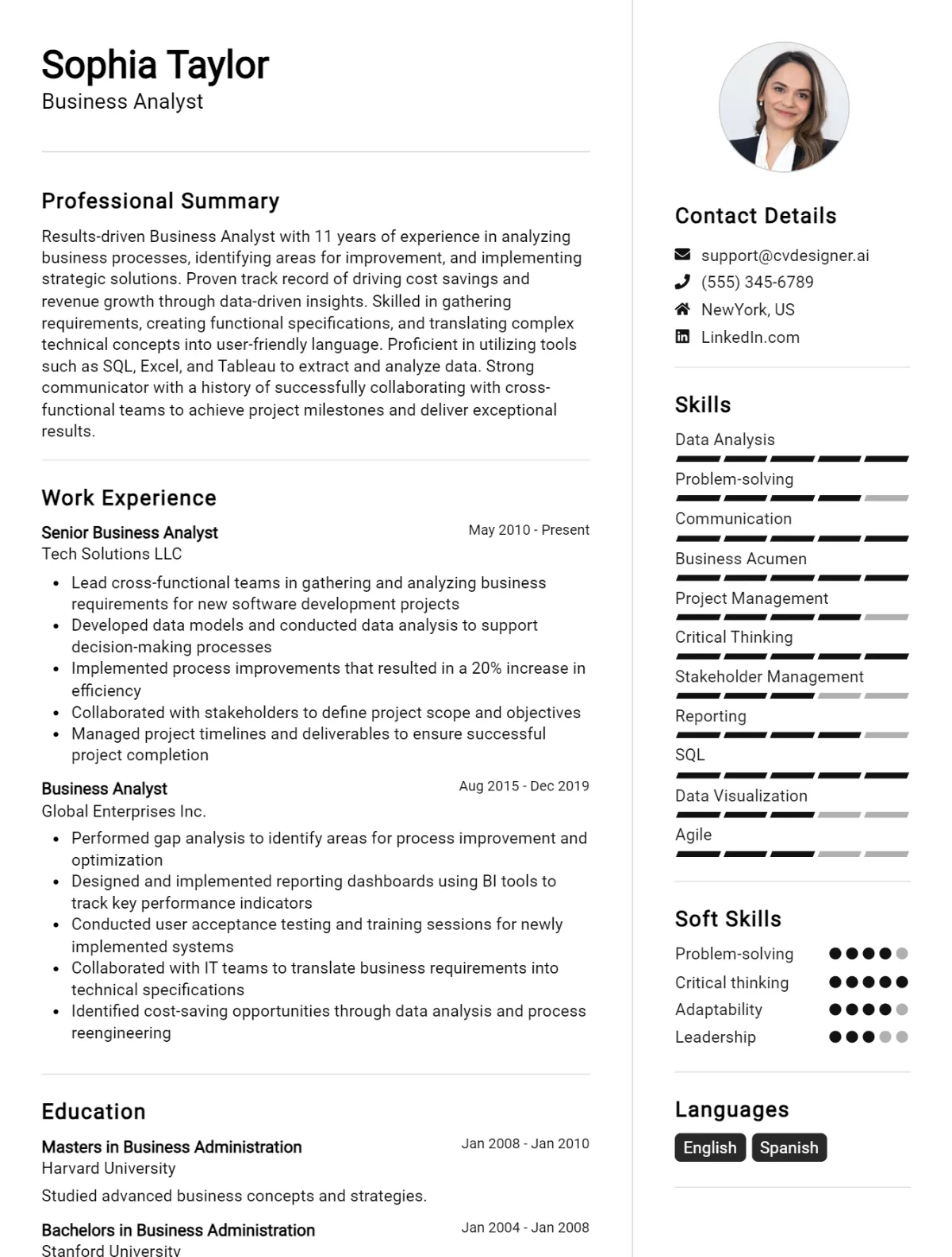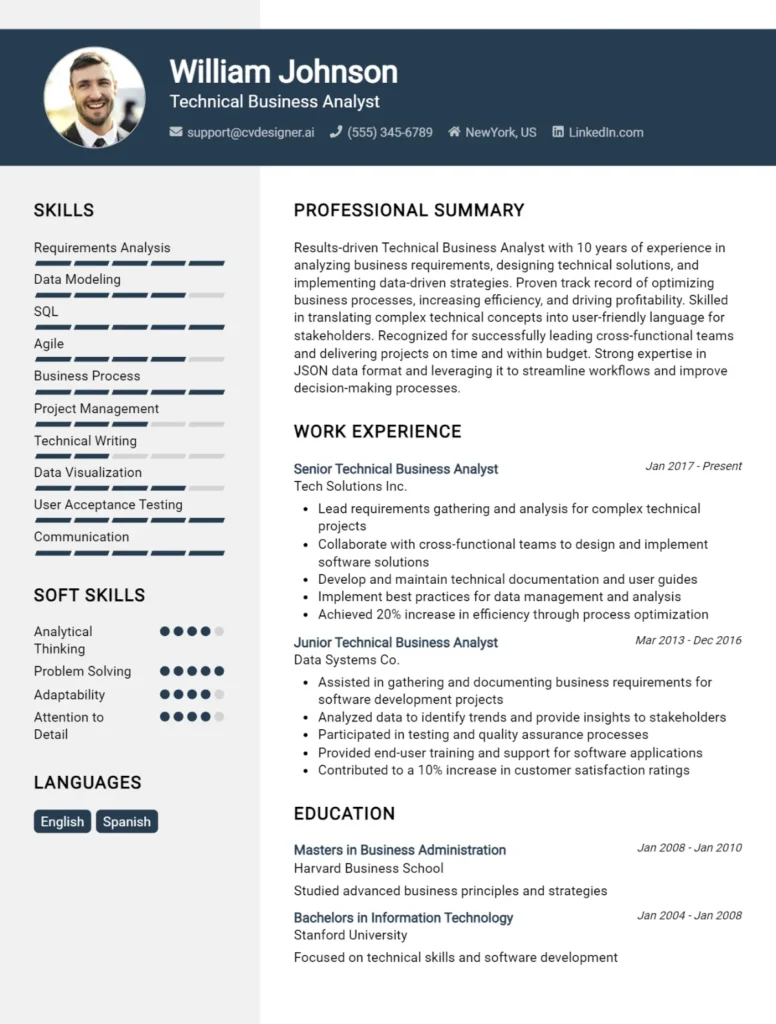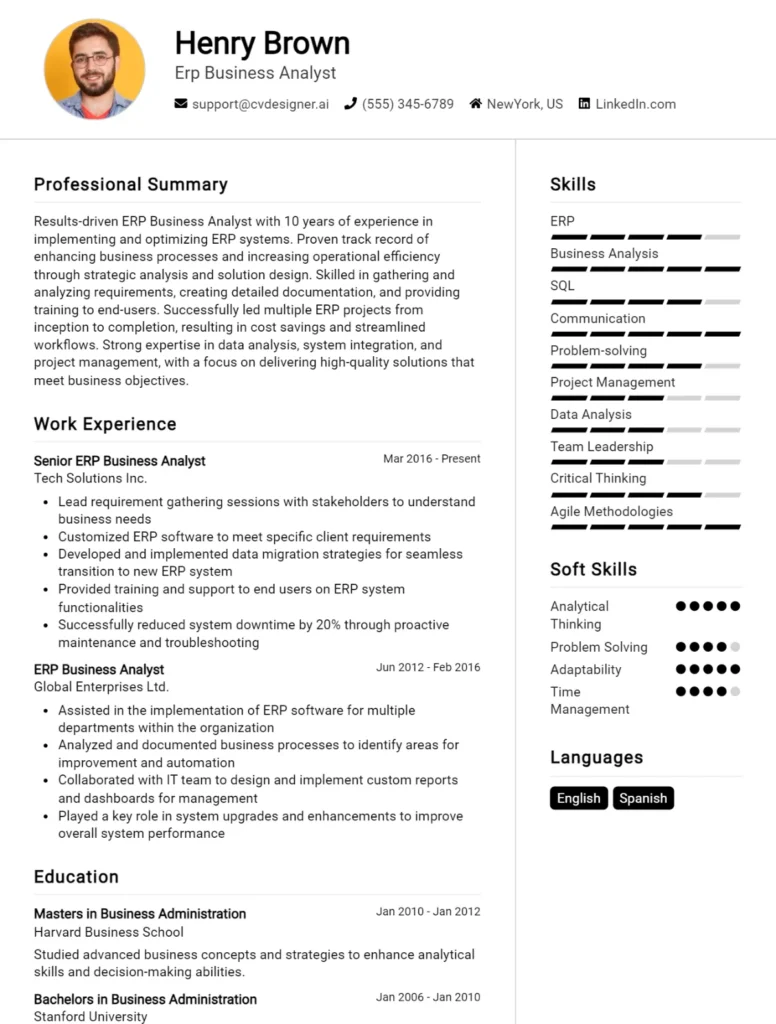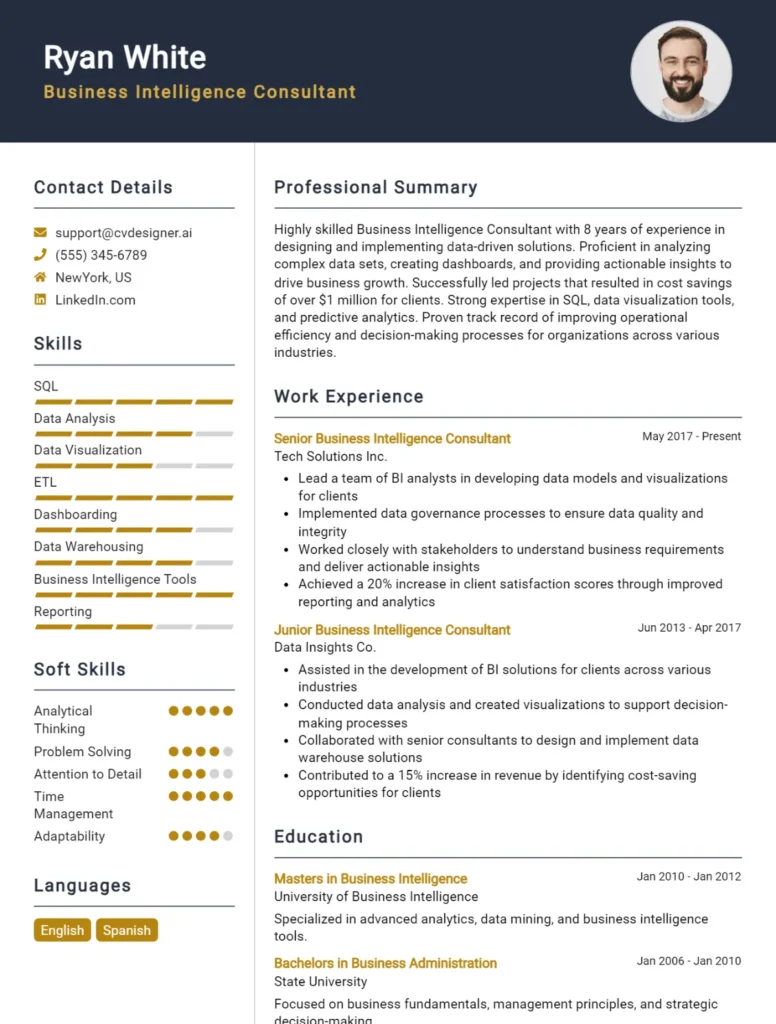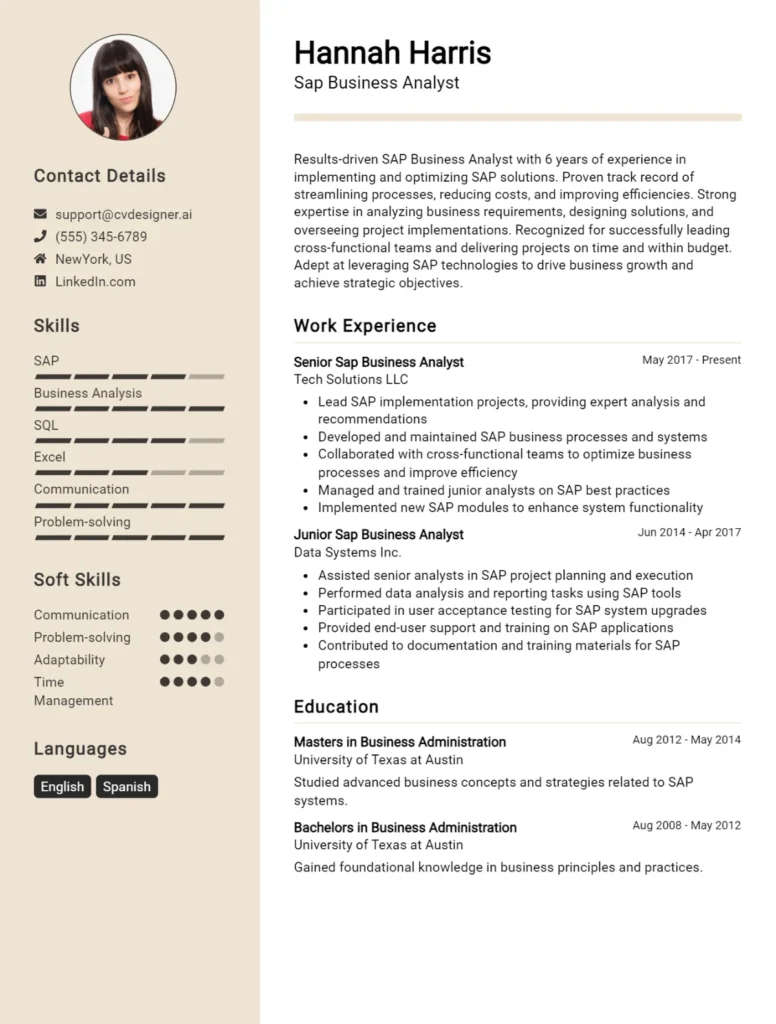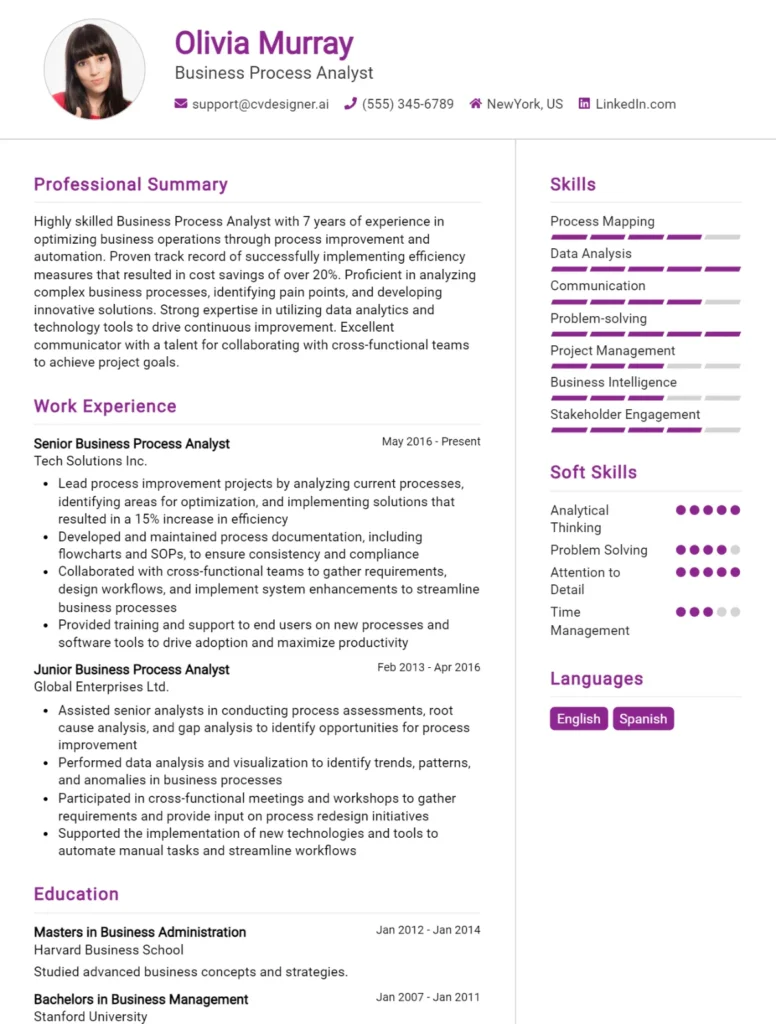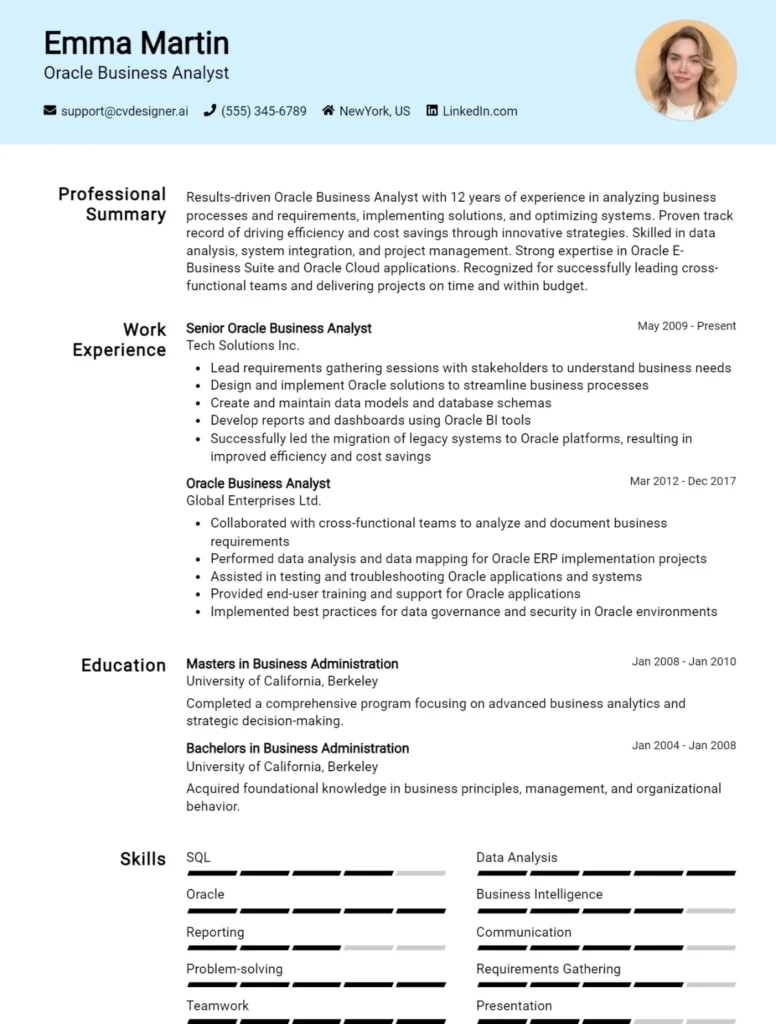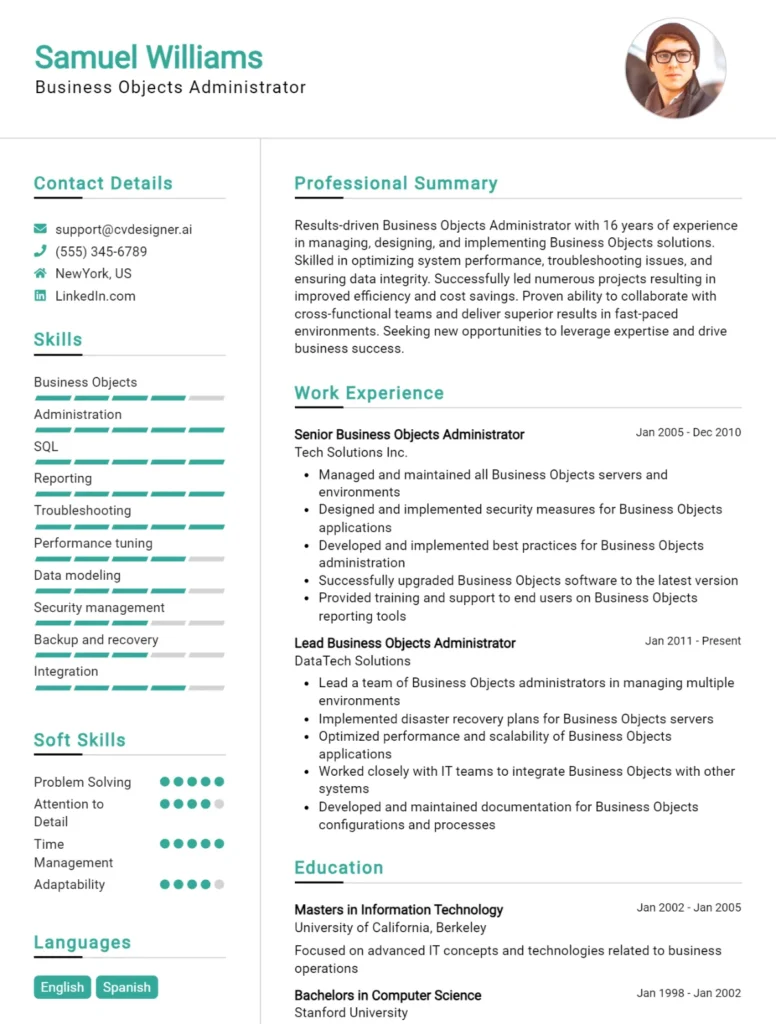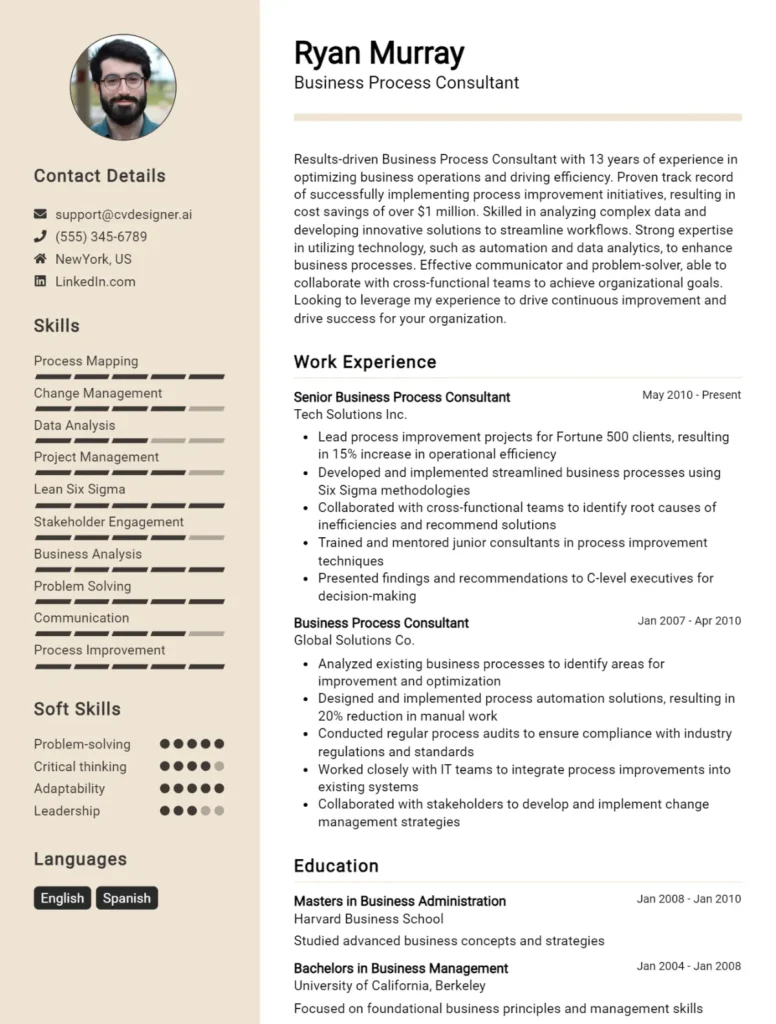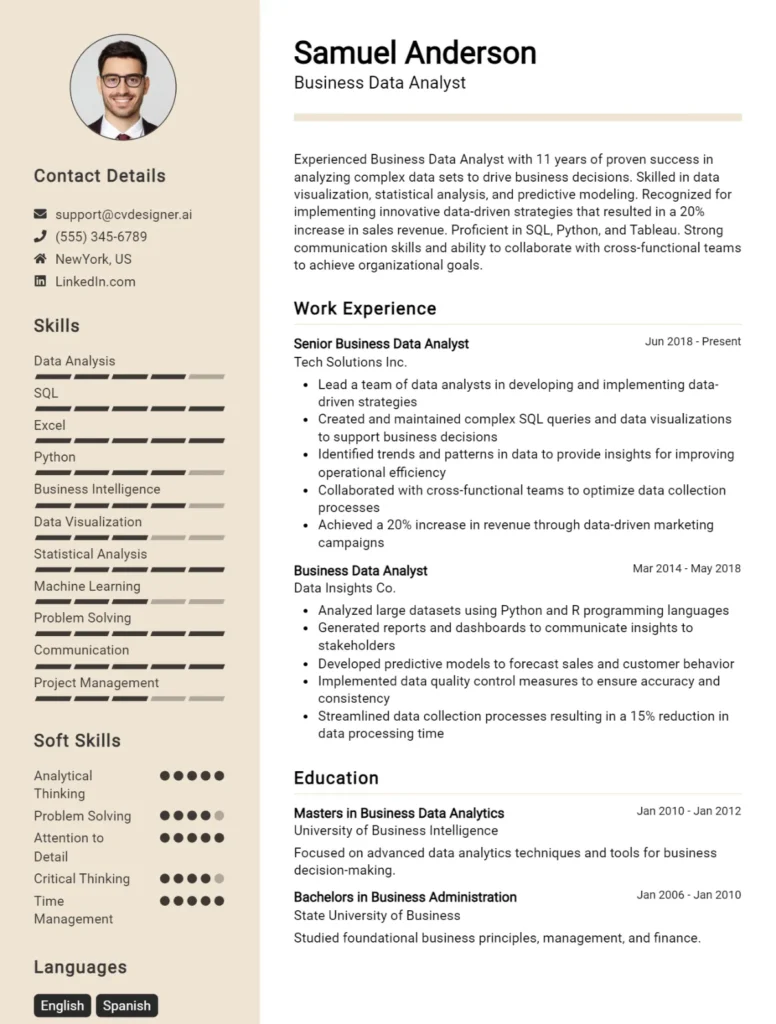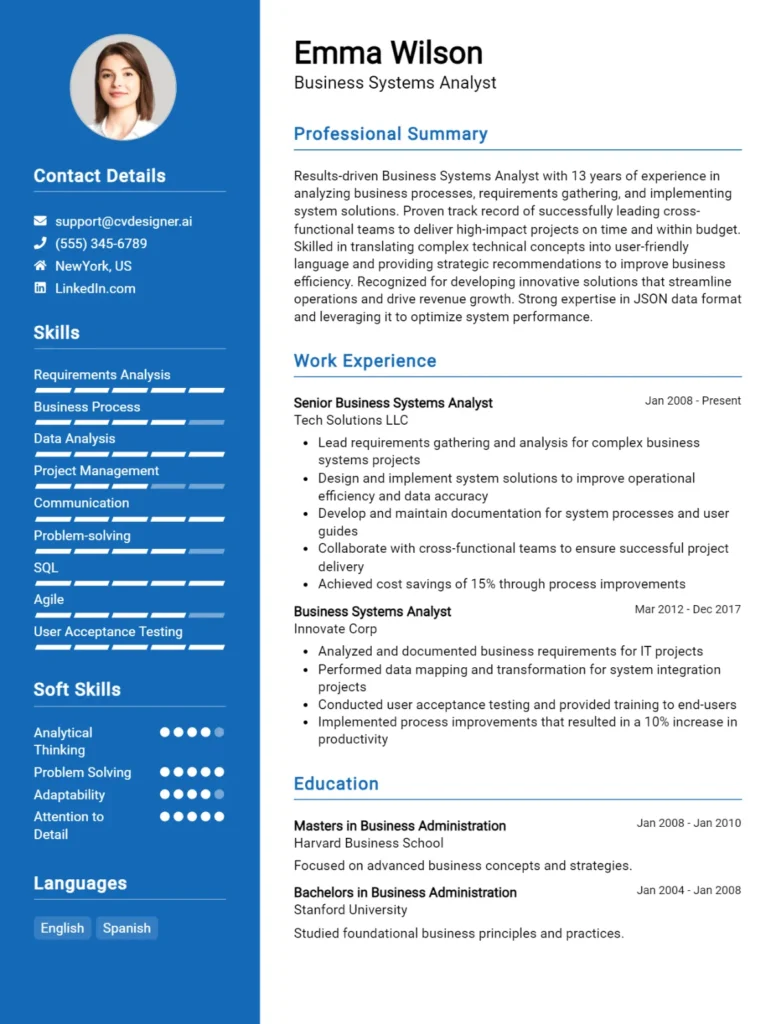Most Popular Business Analyst CV Examples
Explore additional Business Analyst CV samples and guides and see what works for your level of experience or role.
Are you ready to take the next step in your career as a Business Analyst? Crafting a standout CV is essential to showcasing your skills, experience, and potential to prospective employers. In this comprehensive guide, we will delve into the art of writing a compelling Business Analyst CV. You'll learn how to effectively highlight your analytical prowess, problem-solving abilities, and project management experience. From tailoring your CV to specific job descriptions to utilizing impactful language and formatting, we will cover all the key elements to ensure your CV captures attention. Get ready to unlock the secrets of CV writing with the following insights:
- Understanding the essential components of a Business Analyst CV
- Tips for tailoring your CV to specific job postings
- How to effectively showcase your technical skills and tools
- The importance of quantifying your achievements
- Formatting tips to improve readability and impact
- Common mistakes to avoid when writing your CV
- An example CV to illustrate best practices in action
Dive in and discover how to create a CV that not only reflects your qualifications but also sets you apart in the competitive job market!
What is a Business Analyst CV?
A Business Analyst CV serves as a vital marketing tool for professionals seeking to showcase their skills, experience, and qualifications in the field of business analysis. This document highlights key competencies such as data analysis, stakeholder management, and process improvement, allowing candidates to present their ability to bridge the gap between IT and business objectives. A well-structured CV not only illustrates a candidate's career journey but also emphasizes relevant achievements and contributions that align with potential employers' needs. For guidance on crafting an impactful CV, consider referring to a comprehensive cv writing guide.
The importance of a Business Analyst CV extends beyond merely listing qualifications; it is an opportunity to differentiate oneself in a competitive job market. A polished CV can capture the attention of hiring managers and recruiters, making a strong first impression that could lead to interview opportunities. Utilizing tools like a cv maker can streamline the process of creating a professional CV, ensuring that candidates can effectively communicate their value proposition. Ultimately, a well-crafted CV is essential for establishing credibility and securing a position that aligns with one's career aspirations.
Key Components of a Business Analyst CV
- Contact Information: Include your full name, phone number, email address, and LinkedIn profile link.
- Professional Summary: A concise overview of your qualifications, expertise, and career goals tailored for the Business Analyst role.
- Key Skills: Highlight relevant skills such as data analysis, problem-solving, communication, and project management. For an in-depth look at essential skills, visit skills.
- Work Experience: Detail your previous roles, responsibilities, and achievements in business analysis or related fields. This section should emphasize your accomplishments and impact. For guidance on structuring this section, check work experience.
- Educational Background: List your degrees, institutions attended, and dates of graduation. Include any relevant coursework or certifications.
- Certifications: Mention any professional certifications such as Certified Business Analysis Professional (CBAP) or Agile Certification.
- Technical Proficiency: Outline any software tools or methodologies you are proficient in, such as SQL, Tableau, or Agile methodologies.
- Projects: Briefly describe significant projects you have worked on, emphasizing your role, the challenges faced, and the outcomes achieved.
- Soft Skills: Include interpersonal skills that are vital for a Business Analyst, such as teamwork, adaptability, and negotiation skills.
- Industry Knowledge: Highlight any specific industries you have experience in, such as finance, healthcare, or technology, showcasing your versatile understanding.
- Professional Affiliations: List any memberships in professional organizations related to business analysis, which can demonstrate your commitment to the field.
- References: Conclude with a statement that references are available upon request, or include them if preferred.
Sample Business Analyst CV for Inspiration
[Your Name]
[Your Address]
[City, State, Zip]
[Your Email]
[Your Phone Number]
[LinkedIn Profile URL]
Professional Summary
Detail-oriented and analytical Business Analyst with over 5 years of experience in driving business improvements through data analysis and strategic planning. Proficient in gathering and interpreting complex data sets, identifying trends, and delivering actionable insights that enhance decision-making processes. Strong background in project management, stakeholder engagement, and process optimization. Adept at working collaboratively across departments to achieve business objectives and foster innovation.
Work Experience
Business Analyst
ABC Corporation, City, State
January 2020 – Present
- Collaborated with cross-functional teams to define business requirements and translate them into actionable project plans, resulting in a 20% increase in project delivery efficiency.
- Conducted data analysis using SQL and Excel to identify key performance indicators (KPIs) and present findings to stakeholders, leading to informed decision-making and strategy development.
- Developed and maintained comprehensive documentation, including business requirements documents (BRDs), user stories, and process flow diagrams.
- Facilitated workshops and meetings with stakeholders to gather requirements and provide updates on project progress.
- Implemented process improvements that reduced operational costs by 15% over a 12-month period.
Junior Business Analyst
XYZ Solutions, City, State
June 2018 – December 2019
- Assisted senior analysts in gathering and documenting business requirements for various software development projects.
- Analyzed existing business processes to identify inefficiencies and provided recommendations for enhancements.
- Supported user acceptance testing (UAT) efforts, ensuring that delivered solutions met business needs and quality standards.
- Created and maintained project documentation, including status reports and meeting minutes, to ensure transparency and communication among stakeholders.
Education
Bachelor of Science in Business Administration
University of City, City, State
Graduated: May 2018
Skills
- Requirements Gathering and Analysis
- Data Analysis and Reporting (SQL, Excel)
- Project Management (Agile, Waterfall)
- Stakeholder Engagement
- Process Mapping and Improvement
- Strong Communication and Presentation Skills
- Problem Solving and Critical Thinking
- Familiarity with Business Intelligence Tools (Tableau, Power BI)
Publications
- “Enhancing Business Processes through Data Analytics,” Journal of Business Management, March 2022.
- “The Role of a Business Analyst in Agile Projects,” Business Analysis Quarterly, August 2021.
Certifications
- Certified Business Analysis Professional (CBAP)
- Agile Certified Practitioner (PMI-ACP)
- Six Sigma Green Belt
Business Analyst CV Writing Tips
When crafting a CV as a Business Analyst, it’s essential to present your skills and experience in a clear and concise manner that highlights your analytical capabilities and understanding of business processes. Start with a strong summary that encapsulates your expertise and the value you bring to an organization. Use quantifiable achievements to illustrate your impact in previous roles, emphasizing your ability to bridge the gap between IT and business objectives. Tailor your CV to each job application by incorporating relevant keywords from the job description, which can help you stand out in applicant tracking systems. Additionally, ensure your document is well-organized and visually appealing, making it easy for hiring managers to quickly grasp your qualifications.
CV Writing Tips for Business Analysts
- Use a Clear Structure: Organize your CV into distinct sections such as Summary, Skills, Experience, Education, and Certifications for easy navigation.
- Quantify Achievements: Include specific metrics and results from past projects (e.g., "Increased efficiency by 30% through process improvement initiatives") to demonstrate your impact.
- Highlight Technical Skills: Emphasize your proficiency in relevant tools and technologies (e.g., SQL, Tableau, Excel) that are critical for data analysis and reporting.
- Tailor for Each Application: Modify your CV to align with the specific requirements of each job posting, using keywords from the job description.
- Showcase Soft Skills: Include examples of your communication, problem-solving, and team collaboration abilities, as these are crucial for a Business Analyst role.
- Include Relevant Certifications: List any certifications related to business analysis or project management (e.g., CBAP, PMI-PBA) to enhance your credibility.
- Focus on Industry Knowledge: If applicable, highlight experience in specific industries (e.g., finance, healthcare) to demonstrate your understanding of sector-specific challenges.
- Keep it Concise: Aim for a one to two-page CV, ensuring that every word adds value and is relevant to the position you are applying for.
Business Analyst CV Summary Examples
As a Business Analyst, your CV summary is a critical component that highlights your skills, experience, and value to potential employers. A well-crafted summary can set the tone for your entire CV, showcasing your analytical abilities, problem-solving skills, and business acumen. Below are several examples of effective CV summaries for a Business Analyst role.
Dynamic Business Analyst with over 5 years of experience in data analysis, process optimization, and stakeholder engagement. Proven track record of driving efficiency improvements that result in significant cost savings and enhanced operational performance. Adept at translating complex data into actionable insights to support strategic decision-making.
Results-oriented Business Analyst with a strong background in project management and business process reengineering. Skilled in utilizing data-driven methodologies to identify opportunities for growth and improvement. Excellent communicator with a demonstrated ability to collaborate effectively with cross-functional teams.
Detail-oriented Business Analyst with extensive experience in gathering business requirements, conducting market research, and delivering comprehensive reports. Proficient in various analytical tools and methodologies, with a passion for leveraging data to enhance business strategies and drive organizational success.
Strategic Business Analyst with a robust understanding of financial principles and market trends. Capable of developing strategic roadmaps that align with business objectives while ensuring project deliverables are met on time and within budget. Strong analytical thinker with a commitment to continuous improvement.
Innovative Business Analyst with expertise in agile methodologies and user experience design. Committed to bridging the gap between technology and business needs, ensuring that solutions are user-centric and aligned with organizational goals. Proven ability to lead workshops and facilitate discussions to gather requirements effectively.
Build a Strong Experience Section for Your Business Analyst CV
As a Business Analyst, effectively showcasing your work experience is crucial to demonstrate your skills and contributions to potential employers. Below are examples of strong work experience descriptions that highlight your analytical capabilities, project management skills, and ability to drive business improvements.
- Collaborated with cross-functional teams to gather and document business requirements for a new customer relationship management (CRM) system, resulting in a 30% increase in sales team efficiency through streamlined processes.
- Conducted comprehensive data analysis using SQL and Excel to identify trends and insights, enabling the company to make informed decisions that improved customer retention rates by 15% over six months.
- Led workshops with stakeholders to elicit and prioritize requirements for a new inventory management system, successfully delivering a solution that reduced stock discrepancies by 40%.
- Developed detailed process maps and user stories that facilitated the implementation of agile methodologies within the project team, leading to a 25% reduction in project delivery time.
- Managed end-to-end project lifecycles for multiple initiatives, including risk assessment, resource allocation, and stakeholder communication, ensuring projects were completed on time and within budget.
- Utilized data visualization tools like Tableau to create interactive dashboards that provided real-time insights for executive leadership, enhancing decision-making capabilities across the organization.
- Conducted market analysis to benchmark product features against competitors, providing strategic recommendations that contributed to a 20% increase in market share within one year.
- Assisted in the development of training materials and conducted training sessions for end-users, ensuring a smooth transition to new systems and achieving a user adoption rate of over 90%.
Business Analyst CV Education Examples
As a Business Analyst, a strong educational background is essential for understanding business processes, data analysis, and stakeholder management. Here are some examples of relevant educational qualifications that can enhance a Business Analyst's profile:
- Bachelor's Degree in Business Administration: This degree provides a solid foundation in business principles, management strategies, and organizational behavior, equipping candidates with the skills to analyze and improve business operations.
- Bachelor's Degree in Information Technology: With a focus on technology and data management, this degree enables aspiring Business Analysts to bridge the gap between IT and business, ensuring that technology solutions align with organizational goals.
- Master's Degree in Business Analytics: This advanced degree offers specialized knowledge in data analysis, statistical methods, and predictive modeling, empowering Business Analysts to make data-driven decisions and strategic recommendations.
- Certification in Business Analysis (IIBA-CBAP or PMI-PBA): Completing a certification program can validate expertise in business analysis practices and methodologies, showcasing a commitment to professional development and best practices in the field.
- Bachelor's Degree in Economics: An economics degree provides analytical and quantitative skills, helping Business Analysts assess market trends, financial data, and economic factors that influence business decisions.
Skills to Highlight in Your Business Analyst CV
As a Business Analyst, showcasing a balanced mix of soft and hard skills is essential to demonstrate your ability to analyze and interpret data, communicate effectively, and drive business improvements. Below is a list of key skills that can enhance your CV and help you stand out in this competitive field.
Soft Skills:
- Analytical Thinking
- Communication Skills
- Problem-Solving Ability
- Adaptability
- Team Collaboration
- Critical Thinking
- Time Management
- Stakeholder Management
- Conflict Resolution
- Attention to Detail
Hard Skills:
- Data Analysis
- SQL and Database Management
- Business Process Modeling
- Requirements Gathering
- Project Management
- Proficiency in Excel and Other Data Tools
- Knowledge of Agile Methodologies
- Use of Business Intelligence Software (e.g., Tableau, Power BI)
- Wireframing and Prototyping
- Familiarity with ERP Systems
Business Analyst CV Format
When crafting a CV as a Business Analyst, it's essential to tailor the format to reflect your experience and the specific requirements of the role you're applying for. The best CV format varies depending on your career level—entry-level, mid-level, or senior-level positions—each necessitating a different emphasis on skills, experience, and achievements. For detailed guidelines on structuring your CV, refer to the internal article on cv format.
- Entry-Level Business Analysts should focus on a chronological CV format that highlights relevant coursework, internships, and entry-level experience. Include any technical skills, certifications, and projects that demonstrate analytical thinking.
- Mid-Level Business Analysts can benefit from a combination format that emphasizes both skills and professional experience. This format allows you to showcase your accomplishments and contributions to previous employers while detailing your analytical competencies.
- Senior-Level Business Analysts should adopt a functional or hybrid CV format that highlights extensive experience and leadership capabilities. This should include strategic project outcomes, team leadership, and a strong focus on industry-specific expertise.
- Regardless of level, it's crucial to include a summary statement that succinctly outlines your value proposition and key skills relevant to the position.
- Utilize bullet points to list achievements and responsibilities, ensuring they are quantifiable where possible, such as "Improved process efficiency by 30% through data analysis."
- Always tailor your CV to the job description, incorporating keywords that align with the role to increase the chances of passing through applicant tracking systems.
Common Mistakes to Avoid in a Business Analyst CV
When crafting a CV as a Business Analyst, it’s essential to present your skills and experiences in a way that resonates with potential employers. A well-structured CV can set you apart from the competition, but common pitfalls can undermine your efforts. Here are some mistakes to avoid when creating your Business Analyst CV to ensure you make a strong impression:
- Lack of Tailoring: Failing to customize your CV for each job application can make you appear uninterested or generic. Tailor your skills and experiences to align with the specific role you’re applying for.
- Overly Technical Language: While technical skills are important, using too much jargon can alienate hiring managers who may not be familiar with certain terms. Aim for clarity and simplicity in your descriptions.
- Neglecting Soft Skills: Business Analysts require strong communication and interpersonal skills. Omitting these can lead to an incomplete picture of your capabilities.
- Vague Job Descriptions: Generalizing your previous roles can leave employers confused about your actual contributions and impact. Use specific examples and metrics to illustrate your achievements.
- Ignoring Keywords: Many companies use applicant tracking systems (ATS) to filter CVs. Failing to incorporate relevant keywords from the job description can result in your CV being overlooked.
- Inconsistent Formatting: A CV that lacks consistency in font, style, and layout can be distracting and unprofessional. Ensure your formatting is uniform throughout.
- Missing Contact Information: Omitting your contact details or providing outdated information can hinder employers from reaching you for interviews.
- Excessive Length: A CV that is too long can overwhelm hiring managers. Aim for a concise document, ideally one to two pages, focusing on the most relevant experiences.
- Including Irrelevant Information: Adding unrelated work experiences or personal details can detract from the professionalism of your CV. Keep the content focused on your qualifications for the specific role.
- Poor Proofreading: Spelling and grammatical errors can create a negative impression. Always proofread your CV multiple times or have someone else review it to catch any mistakes.
Key Takeaways for a Business Analyst CV
- Start with a strong professional summary that highlights your experience, skills, and what you bring to the role of a Business Analyst.
- Use action verbs to describe your responsibilities and achievements in previous roles, ensuring clarity and impact.
- Tailor your CV to the specific job description by incorporating relevant keywords and phrases that match the requirements.
- Highlight your technical skills, including proficiency in data analysis tools, SQL, and business intelligence software.
- Include soft skills that are crucial for a Business Analyst, such as communication, problem-solving, and stakeholder management.
- Provide quantifiable achievements, such as project outcomes, cost savings, or efficiency improvements, to demonstrate your impact.
- List relevant certifications, such as Certified Business Analysis Professional (CBAP) or Agile Analysis Certification (AAC), to add credibility.
- Incorporate a section for professional development, showcasing any workshops, training, or courses related to business analysis.
- Use a clean and professional layout, leveraging cv templates for an aesthetically pleasing presentation.
- Consider using a cv builder to streamline the creation process and ensure that all key elements are included.
- Don’t forget to include a section for your cover letter, as a well-crafted cover letter templates can complement your CV and strengthen your application.
Build your CV in minutes
Use an AI-powered cv builder and have your cv done in 5 minutes. Just select your template and our software will guide you through the process.
